- WE MOVED !!!
-
 Professional Acupuncture & Physical Therapy1118 East Superior Street
Professional Acupuncture & Physical Therapy1118 East Superior Street
Duluth, MN 55802(218) 724-3400 Clinic Hours
Mon8:00 am - 4:30 pmTue1:45 pm - 4:30 pmWed8:00 am - 4:30 pmThu8:00 am - 4:30 pmFriCLOSED

- Long Covid Booklet
Blog
Embrace the Beauty of Peony Root: Unveiling the Healing Powers of a Summertime Herb
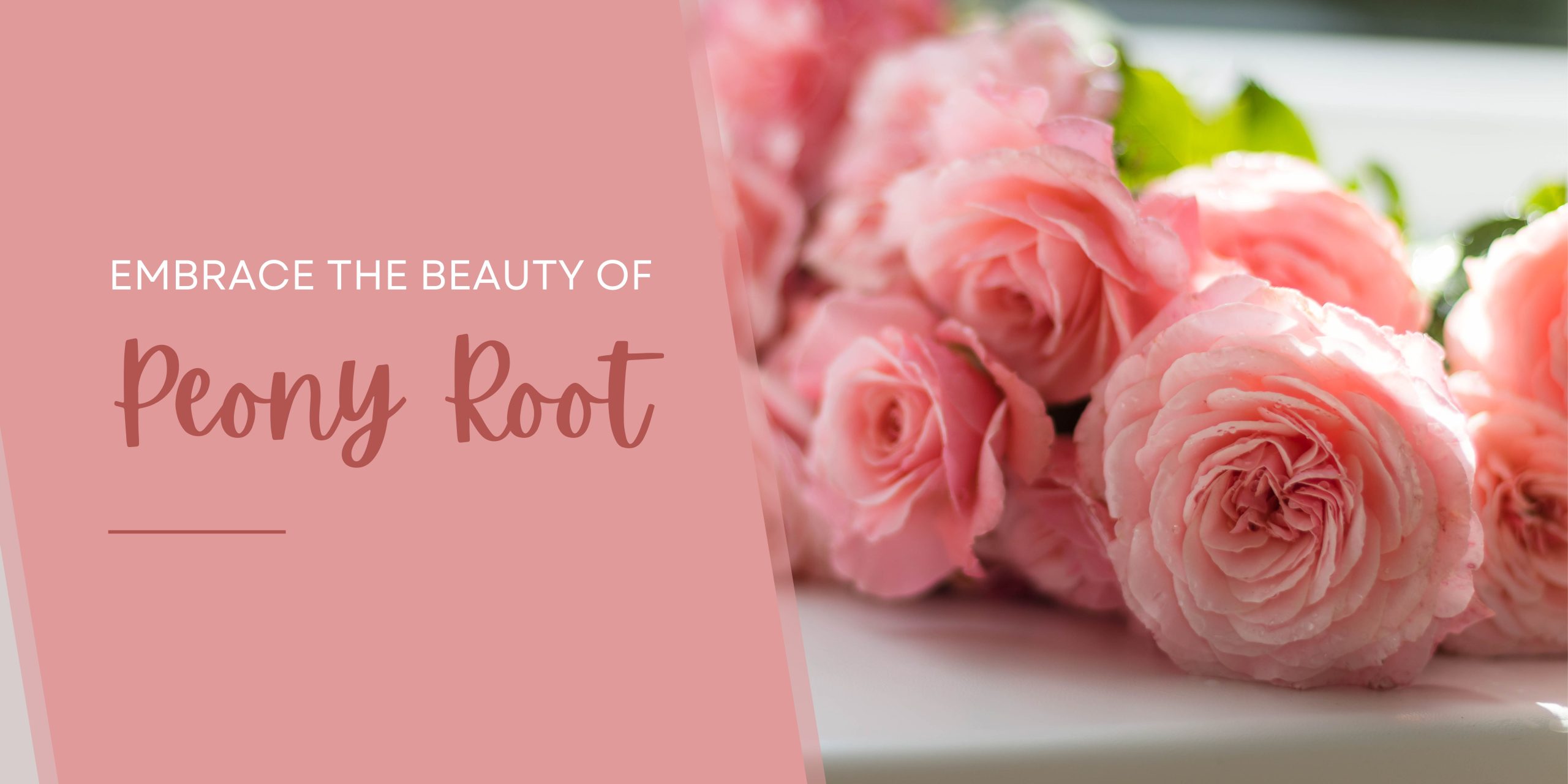
Hey there, herb enthusiasts! Today, we’re diving into the enchanting world of Peony Root, also known as Bai Shao. This stunning herb has a lot to offer, especially during the summer season. Get ready to discover the remarkable healing powers hidden within this beauty!
Finding Balance with Peony Root
Peony Root is like a summer breeze that brings balance to your body and mind. One of its incredible benefits is hormone balancing. Ladies, listen up! If you struggle with menstrual irregularities, Peony Root might be your new best friend. It helps regulate your cycle and eases discomfort, bringing harmony to your summertime.
Recipe Idea – Peony Root Tea:
Brew yourself a cup of hormone-balancing Peony Root Tea. Start by simmering a tablespoon of dried Peony Root in two cups of water for 20-30 minutes. Strain the tea into your favorite mug and sip it slowly. Feel the calming effects wash over you as you take a moment to restore balance within.
A Friend for Pain and Mood
Summertime is all about feeling good, inside and out. Peony Root has some surprising powers when it comes to relieving pain and improving emotional well-being. If you’re dealing with muscle cramps or tension, Peony Root can come to the rescue. It acts as a natural analgesic, soothing those summertime aches.
But that’s not all! Peony Root is also known for its sedative properties. So, if you find yourself feeling irritable or experiencing mood swings, this herb can help bring some calm to the storm. It harmonizes the liver, allowing you to enjoy the sunny days with a smile.
Recipe Idea – Calming Peony Root Bath:
Create a calming Peony Root bath to wash away the stress of the day. Start by boiling a handful of dried Peony Root in a large pot of water for 10 minutes. Strain the liquid and pour it into your warm bath. Step in and let the soothing properties of Peony Root envelop you, leaving you feeling relaxed and renewed.
As you embrace the beauty of summer, don’t forget to invite Peony Root along for the journey. Whether you’re seeking hormonal balance, pain relief, or emotional well-being, this herb has got you covered. Savor a cup of hormone-balancing Peony Root Tea or indulge in a calming Peony Root bath.
As always, consult with Heidi to to ensure the safe and proper use of herbs.
Embrace the magic of Peony Root and let it enhance your summertime bliss!
Acupuncture as a Safe Alternative for Managing Juvenile Arthritis

Juvenile arthritis, also known as pediatric rheumatic disease, is one of the most common chronic diseases affecting children, impacting nearly 300,000 children in the United States alone. Despite its prevalence, there’s a significant need for safe, non-pharmacological alternatives to help manage the condition. Acupuncture, a centuries-old practice rooted in traditional Chinese medicine, has been increasingly recognized as one such promising alternative.
Understanding Juvenile Arthritis
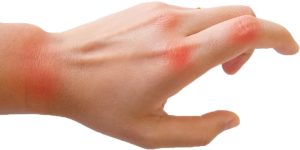 Before delving into the benefits of acupuncture for juvenile arthritis, it’s essential to understand the condition. Juvenile arthritis encompasses several types of autoimmune and inflammatory conditions that can develop in children under 16. These conditions are characterized by inflammation of the joints, leading to pain, swelling, stiffness, and potentially impacting physical development.
Before delving into the benefits of acupuncture for juvenile arthritis, it’s essential to understand the condition. Juvenile arthritis encompasses several types of autoimmune and inflammatory conditions that can develop in children under 16. These conditions are characterized by inflammation of the joints, leading to pain, swelling, stiffness, and potentially impacting physical development.
Pharmacological treatments like nonsteroidal anti-inflammatory drugs (NSAIDs), corticosteroids, and disease-modifying anti-rheumatic drugs (DMARDs) are often prescribed to manage the condition. However, they carry the potential for significant side effects, especially with long-term use. The pursuit of safer, effective alternatives has led to the exploration of integrative therapies like acupuncture.
Acupuncture: An Overview
Acupuncture involves the insertion of thin needles at specific points in the body, known as acupuncture points. This practice is based on the concept of Qi, or vital energy, that traditional Chinese medicine posits flows through the body. It’s believed that stimulating these points can correct imbalances in the flow of Qi, thereby improving health and wellness.
Acupuncture for Juvenile Arthritis: The Research
Several research studies have explored the potential benefits of acupuncture for juvenile arthritis. A growing body of evidence supports acupuncture’s effectiveness for managing chronic pain conditions, including arthritis.
For instance, a 2018 systematic review published in “The Journal of Pain” found that acupuncture was effective in reducing pain severity and improving the quality of life in chronic pain patients. A meta-analysis published in the “Arthritis Research & Therapy” journal in 2019 reported similar findings for adult patients with osteoarthritis, showing that acupuncture significantly reduced pain intensity and improved physical function.
While exploration on the benefits of acupuncture and Juvenile Arthritis still needs to be explored, these studies suggest that acupuncture has potential as a therapeutic option for managing the pain and inflammation associated with juvenile arthritis.
The Benefits of Acupuncture for Juvenile Arthritis
- Pain Relief: Acupuncture is widely recognized for its analgesic properties. It’s believed to stimulate the body’s production of endorphins, often referred to as “natural painkillers.”
- Improved Physical Function: By reducing pain and inflammation, acupuncture may improve the range of motion in affected joints, promoting better mobility and physical function.
- Enhanced Quality of Life: By managing pain and improving physical function, acupuncture can potentially improve the overall quality of life for children suffering from juvenile arthritis.
- Safety and Few Side Effects: Acupuncture is generally considered safe when performed by a trained practitioner. The side effects, if any, are typically mild and transient, including temporary soreness or bruising at the needle sites.
- Non-Pharmacological Approach: Acupuncture offers a non-pharmacological alternative to conventional treatments, reducing the risk of side effects associated with long-term medication use.
It’s time to think outside the box in the fight against juvenile arthritis. The pain and physical limitations associated with this condition can greatly affect a child’s quality of life. However, we’re here to offer a safe, non-pharmacological alternative that holds the potential to manage these symptoms effectively – acupuncture.
The efficacy of acupuncture in managing chronic pain, including arthritis-related pain, has been increasingly recognized. With minimal side effects and the potential for significant pain relief and improved physical function, acupuncture could offer your child an effective way to combat the pain and restrictions posed by juvenile arthritis.
But it all begins with a simple step: Seeking out a consultation with a certified acupuncturist. There’s no “one-size-fits-all” approach to managing juvenile arthritis, and a personalized assessment is critical for tailoring the best acupuncture treatment for your child. These professionals are trained to understand your child’s unique needs and can work alongside your child’s rheumatologist to provide an integrated care plan.
Imagine a world where your child experiences less pain, enjoys better mobility, and can engage in their favorite activities without being held back by arthritis. That’s the world we envision, and it’s one that acupuncture can help to create.
So, don’t wait. Make the decision today to explore how acupuncture could support your child’s journey with juvenile arthritis. Call Heidi at (218) 724-3400, and let’s take the first step towards unlocking a brighter, healthier future for your child.
Home Remedies for Anxiety Management
Anyone who has suffered from anxiety knows how paralyzing it can be. It’s hard to know what to do in a moment of panic to break the cycle of distress. But just doing something, anything, in the direction of self-help can shift our entire mental, emotional and physiological experience. It has been said that “action is the antidote to anxiety”. Here are some Chinese Medicine inspired tips to consider when we need a little guidance in taking action.
Slow Your Breath
Sounds simple but this is the most important first step as slow, paced breathing has the power to help us regulate emotions while giving us access to frontal lobe reasoning and flexibility in thought to see our way through stressful situations. Slow, deep breathing, as taught in Qi Gong (ancient energy cultivation practice) pacifies the sympathetic (fight-or-flight) nervous system , calming the mind and body simultaneously.
Rub Your Lower Back
The kidneys are important in anxiety-care because they house the Zhi, the spirit of the kidneys. Zhi loosely translates to the will. It relates to our place and purpose in the world and helps us feel safe and secure in our existence and our destiny. With kidney deficiencies, we can lose that spiritual support from the zhi. Anxiety and fears can take hold. Chinese medicine encourages us to warm the kidneys daily with the friction of (mid to) low back rubs.
Spend Some Time In Nature
Another way to restore that sense of safety and belonging is to get in nature. In our technological society we can easily feel disconnected and forget that we are a part of nature. Chinese Medicine, rooted in Taoist philosophies, reminds us that true health is harmony with nature. We can help reset our natural rhythms by a walk in the forest or a meditation in the garden. Get some sun on your face and some earth under your feet! The act of connecting barefoot feet to the ground has been said to recharge our kidney energy through the kidney pressure point on the bottoms of the feet, and this practice of “earthing” has actually been shown to have many beneficial effects on the body!
Press These Acu Points
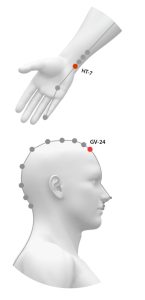 HEART-7: Shen men (spirit gate) Located on the inside of your wrist, in the crease, on the pinky side. Calms the heart, physically and emotionally, to relieve anxiety.
HEART-7: Shen men (spirit gate) Located on the inside of your wrist, in the crease, on the pinky side. Calms the heart, physically and emotionally, to relieve anxiety.
Du-24 Shenting (spirit courtyard) Located at the top-center of the forehead over the pre-frontal cortex of the brain. Has a sedative effect and helps to restore balance between emotions and logic.
Reach Out To Family And Friends
ounds simple but this is the most important first step as slow, paced breathing has the power to help us regulate emotions while giving us access to frontal lobe reasoning and flexibility in thought to see our way through stressful situations. Slow, deep breathing, as taught in Qi Gong (ancient energy cultivation practice) pacifies the sympathetic (fight-or-flight) nervous system , calming the mind and body simultaneously.
Tap Your Upper Chest
The Kidney ‘transport’ points are found on the upper chest on either side of the sternum. Each of these points deal with emotional or spiritual aspects of our health. Tapping these points gently with fingertips has been shown to have profound effects in emotional healing practices such as EFT (Emotional Freedom Technique).
Make A Cup Of Tea
Trade in your coffee for chamomile, an easily accessible tea flower that has calming properties. Add some rose petals to move the liver qi and soothe feelings of frustration. If you can get your hands on some mimosa flowers, sprinkle those in the mix to bring your heart back into balance.
One of the best actionable self-help steps is calling at (218) 724-3400 and making your next acupuncture appointment in Duluth MN with Heidi. We are here for you with all the tools and knowledge to support a balanced nervous system and help you feel your best self!
Research Update | The Effects of Acupuncture on Allergies
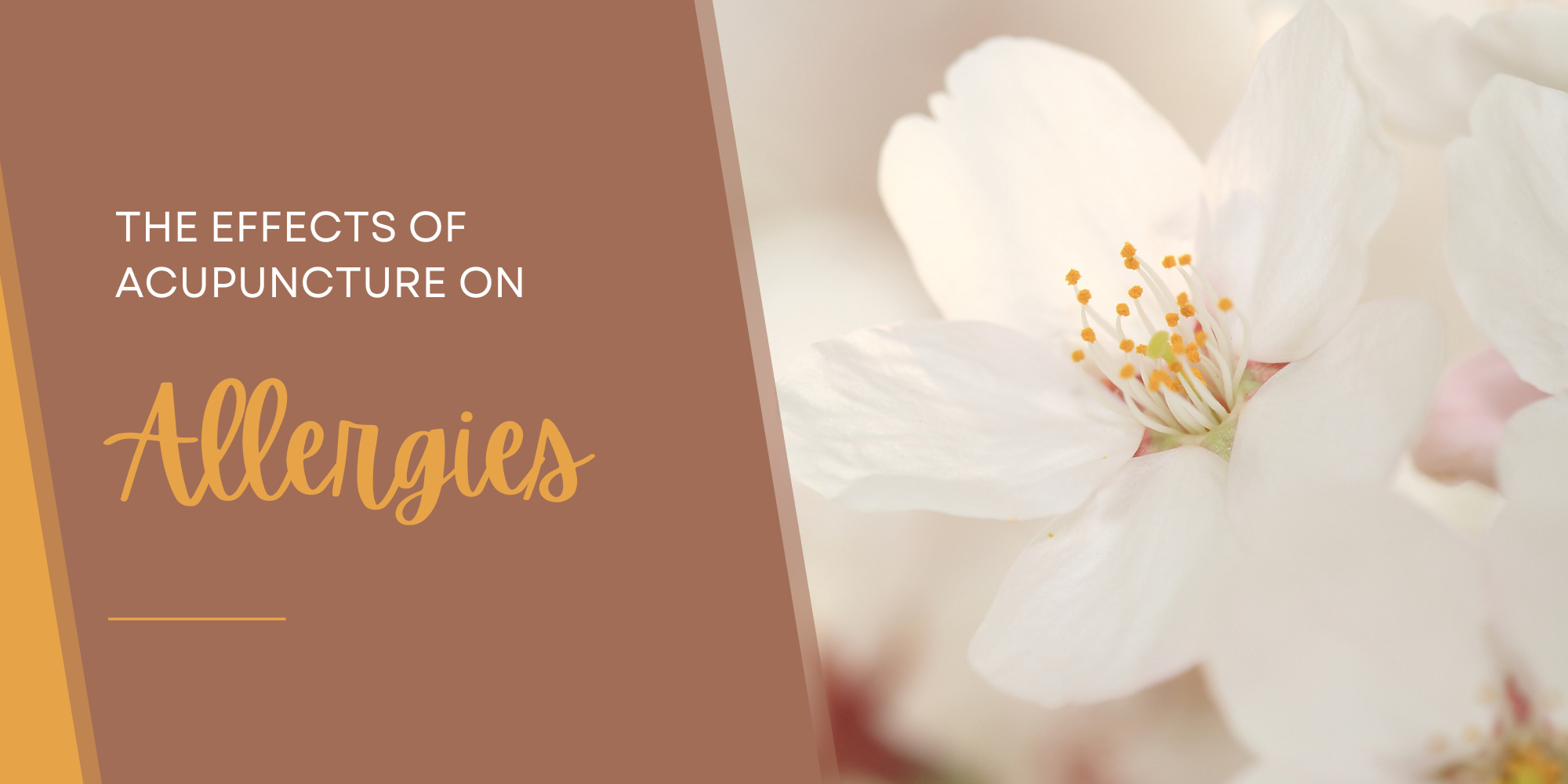
Millions of people (as many as 50 million per year) suffer from recurring allergy symptoms. The causes of allergies are as many as the people who suffer from them. The severity of an individual’s reaction to a given allergy can vary greatly from one person to another and one allergic event to the next. Allergies range in severity from minor to mild, to irritating to severe, and some allergies can even be deadly.
The most common, most problematic allergic sensitivity is Hay Fever or allergic rhinitis. Many people miss work and other important activities on a seasonal basis when severe Hay Fever symptoms are not controlled.
For these reasons, many people seek relief from allergies, and fortunately there are many healthcare options available for those who are looking for better ways to treat their allergies. One of the most promising, and often overlooked treatments can be acupuncture and acupressure.
The Effect of Acupuncture on Allergies
While medication can reduce inflammation and suppress other symptoms of allergies, medications almost always come with undesirable side effects. Few medications can resolve the underlying problem that makes a given person allergic to a given substance. Conversely, acupuncture has been used for a number of years now by a wide range of practitioners to successfully relieve allergy symptoms.
Acupuncture is an ancient practice developed in mainland China. It has been used for a wide variety of conditions. Since becoming popular in the West, it has been frequently used as a complement to western medicinal options.. Acupuncture helps to correct functional imbalances and restore the flow of your body’s innate energies, thus returning you to a more natural state of well-being. And hopefully allergy-free!
Acupuncture, and Its Effect on Allergic Rhinitis
This study took aim at the most troublesome of all allergies, allergic rhinitis. It corroborates the reports by patients and practitioners that acupuncture is an effective way to treat allergies.
The study looked at 422 patients who tested positive for pollen allergies and presented with allergic nasal symptoms. The researchers randomly assigned participants to three different groups. One group was given 12 acupuncture treatments and took antihistamines as they normally would. The next group took 12 sham acupuncture treatments and antihistamines as they would normally do to combat symptoms. The third group took only antihistamines with no acupuncture treatments.
The research team found that those who received both real acupuncture and antihistamines reported the largest decrease in symptoms. They also reported using antihistamines less frequently than the other two groups.
While this study was limited to one allergy, it is promising that other, if not all chronic allergies, can be successfully treated through the regular use of acupuncture and/or acupressure.
If you or someone you know suffers from allergies, give us a call at (218) 724-3400, maybe acupuncture can help.
Source
Benefits of Acupuncture for Allergies
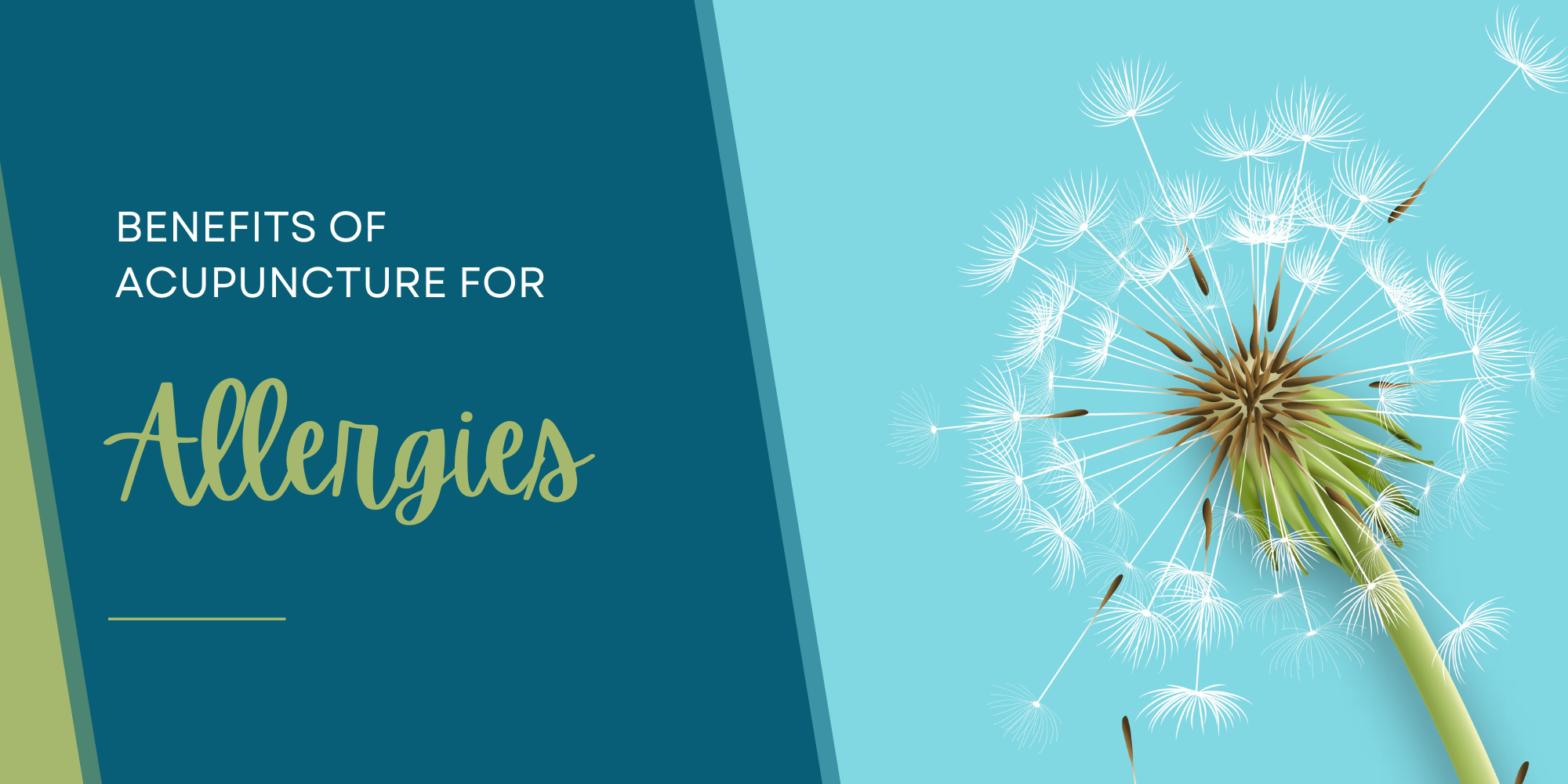
A runny nose, sneezing, itching and watery-eyes…also known as symptoms of allergies. Seasonal allergies can really be a pain. It is estimated that nearly 50 million Americans suffer from seasonal allergies every year. And, the amount of money being spent on over-the-counter allergy medications is over $18 billion.
But, what if there was a way to combat seasonal allergies without the side effects of medications and to actually get to the root of the problem instead of just masking the symptoms? Well, there is a way to do this, and it’s called acupuncture.
Acupuncture and traditional Chinese medicine offer a permanent solution to seasonal allergies with an all-natural approach that will ultimately save you money. Since traditional Chinese medicine (TCM) attacks allergies in a much different method than Western medicine, there is a good chance your allergies will cease to be a problem. Western medicine knows how allergies work and what happens to the body, but there is still no explanation as to why. TCM doesn’t need to know why because TCM looks at the body as a whole and uses an elemental system to determine where there are excesses and deficiencies in each person. So the TCM treatments are completely customized to each patient, thus making them much more effective than over-the-counter medications.
When using TCM to treat allergies, practitioners focus heavily on something called Wei Qi. Wei Qi is similar to the immune system in Western medicine. Wei Qi protects the body against foreign materials that can lead to inflammation and eventually allergies. People with lower immunity/Wei Qi are more susceptible to allergies and frequent colds. Acupuncture helps to boost the Wei Qi making it more difficult for allergens to attack the body.
Acupuncture by itself will make a difference in fighting allergies, but adding herbs and herbal formulas will provide the final punch to help eliminate allergies for good. Because each patient has different causes for their allergies, adding herbal formulas can greatly increase the efficacy of the acupuncture treatments by extending the effect of the needles. For example, if a patient specifically gets itchy, or watery eyes when their allergies flare up, then the practitioner would likely want to draw the excess energy/element down. In this particular case, the patient would have an excess of fire creating wind. The practitioner would use acupuncture points known to decrease fire and wind in the body. Then also adding herbs that do the same thing, would create a one-two punch type of treatment that has longer lasting, more permanent effects.
Ultimately what acupuncture does is boost the Wei Qi/immune system while decreasing the inflammatory response in your body that occurs when an allergen is encountered. The other aspect of treatment, as stated earlier, is to look at the patient as a whole versus just the symptoms. A good acupuncturist will also focus on dietary habits that may be contributing to your allergies. Many times a person’s Wei Qi is depleted from within due to the foods they are eating. Things like sugar and dairy are often associated with a lower immune system. Eliminating or drastically reducing these items will allow the body to recover more quickly, making allergy attacks easier to resolve.
A comprehensive plan including acupuncture treatments, herbs and dietary changes will yield the best results when it comes to fighting allergies. Be sure to call us at (218) 724-3400 to schedule an appointment with Heidi and you will be grateful year after year for the relief they provide when it comes to treating allergies.
